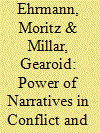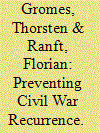| Srl | Item |
| 1 |
ID:
183225


|
|
|
|
|
| Summary/Abstract |
Recent research has found evidence for a linkage between conflict induced-displacement and violence. Yet, displacement is also caused by natural disasters, whose implications for security have until now not received much attention. Drawing on spatial data on flood-induced disasters and forced migration in Africa, we investigate the impact of migration caused by natural disasters on social conflict. We show that disaster-induced displacement differs from conflict-induced displacement and raises distinct security implications. We also consider if areas simultaneously affected by conflict and disaster-induced migration are particularly at risk of conflict. The results suggest that there is no such amplifying effect.
|
|
|
|
|
|
|
|
|
|
|
|
|
|
|
|
| 2 |
ID:
183226


|
|
|
|
|
| Summary/Abstract |
For the ten years prior to the Turkish partition of Cyprus into Greek and Turkish Cypriot zones, the Turkish Cypriot community lived in distinct ethnic enclaves governed by a parallel Turkish Cypriot administration. I argue that Turkish Cypriot elites formed a system of reciprocal relations with their community by acting as ethnic protection racketeers. With few material resources, but a demand for protection during intercommunal fighting, Turkish Cypriot leaders monopolised protection over and within enclaves, while also deterring co-ethnics from leaving their protection despite poor conditions. Ultimately, this influenced Turkish Cypriot preferences in UN-led talks, demanding to retain autonomy over specific territories they controlled, especially in providing security.
|
|
|
|
|
|
|
|
|
|
|
|
|
|
|
|
| 3 |
ID:
183228


|
|
|
|
|
| Summary/Abstract |
The Nigeria-Biafra war, which lasted from 1967 to 1970, was fought on various fronts and in various tactics. Although the war was about the independence of the Republic of Biafra from Nigeria, for Oguta people of Southeastern Nigeria, it was a challenge to their goddess, Mammy Water and the people’s faith in her to protect their lives and properties. This paper, thus, studies the involvement of Mammy Water and her women cult during the Nigeria-Biafra war in Oguta. The findings indicated that the intervention of the goddess and her cult members in the war is a well-known event in Oguta.
|
|
|
|
|
|
|
|
|
|
|
|
|
|
|
|
| 4 |
ID:
183229


|
|
|
|
|
| Summary/Abstract |
Presenting original data from interviews conducted in Iraq between 2013 and 2019, this paper charts the evolution of conflict related narratives of the ‘other’ among members of the Sunni confession immediately prior to, during, and after the rise and fall of the Islamic State (IS). It charts the evolution of these narratives through three escalatory phases (victimhood narratives, divisive narratives, and violent narratives) and three de-escalatory phases (nuanced narratives, reconciliatory narratives, and unifying narratives). It concludes with reflections on the lessons this case can provide for identifying the best moments for Conflict Resolution actors to intervene in such violent conflicts.
|
|
|
|
|
|
|
|
|
|
|
|
|
|
|
|
| 5 |
ID:
183230


|
|
|
|
|
| Summary/Abstract |
Existing research suggests that peace is more stable after military victories than it is after peace agreements. This article challenges this conventional wisdom. By applying survival analysis, we demonstrate that peace agreements exhibit just as strong of a relationship to enduring peace as military victories do. Moreover, we investigate the assumptions that underpin the aforementioned claim. These assumptions link peace survival to the type of civil war termination and refer to intervening variables. Using time-series data for 48 civil wars that ended between 1990 and 2009, the empirical analysis finds support for only two underpinning assumptions in favour of victories.
|
|
|
|
|
|
|
|
|
|
|
|
|
|
|
|
| 6 |
ID:
183227


|
|
|
|
|
| Summary/Abstract |
What explains variation in the intensity with which armed groups seek to socialise civilians into their ideology? This paper seeks to expand the literature on rebel governance and ideology in war to consider the ideational interaction between armed groups and civilians. A paired comparison examines the Naxalite Rebellion in India (1967-72) and the Shining Path Insurgency in Peru (1980-1992), which exhibited puzzling variation in socialisation intensity despite holding similar ideologies. I argue this variation can be explained by differences in combatant socialisation, how groups value reading- and writing-based education, and whether groups understand civilian participation as crucial for achieving victory.
|
|
|
|
|
|
|
|
|
|
|
|
|
|
|
|